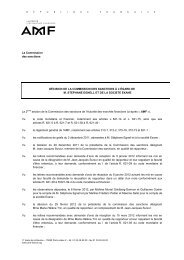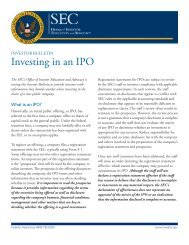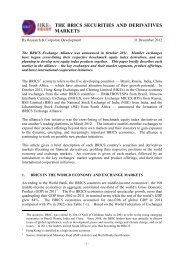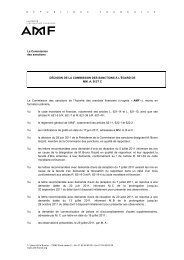Climate change, impacts and vulnerability in Europe ... - MemoFin.fr
Climate change, impacts and vulnerability in Europe ... - MemoFin.fr
Climate change, impacts and vulnerability in Europe ... - MemoFin.fr
You also want an ePaper? Increase the reach of your titles
YUMPU automatically turns print PDFs into web optimized ePapers that Google loves.
Technical summaryTable TS.1 Observed <strong>and</strong> projected climate <strong>change</strong> <strong>and</strong> <strong>impacts</strong> on environmental <strong>and</strong>socio‐economic systems <strong>and</strong> human health (cont.)CryosphereSnow cover (C)Greenl<strong>and</strong> ice sheet(C)Glaciers (C)Arctic (C) <strong>and</strong>Baltic sea ice (N)Perma<strong>fr</strong>ost (C)What is already happen<strong>in</strong>gSnow cover extent <strong>in</strong> the Northern Hemisphere hasfallen by 7 % <strong>in</strong> March <strong>and</strong> 11 % <strong>in</strong> April dur<strong>in</strong>gthe past four decades. In w<strong>in</strong>ter <strong>and</strong> autumn nosignificant <strong>change</strong>s have occurred. Snow mass <strong>in</strong><strong>Europe</strong> has decreased by 7 % <strong>in</strong> March <strong>fr</strong>om 1982to 2009.The Greenl<strong>and</strong> ice sheet <strong>change</strong>d <strong>in</strong> the 1990s<strong>fr</strong>om be<strong>in</strong>g <strong>in</strong> near mass balance to los<strong>in</strong>g about100 billion tonnes of ice per year. Ice losses haves<strong>in</strong>ce then more than doubled to 250 billion tonnesa year averaged over 2005 to 2009. The recentmelt<strong>in</strong>g of the Greenl<strong>and</strong> Ice Sheet is estimated tohave contributed up to 0.7 millimetres a year toglobal sea-level rise (about one quarter of the totalsea-level rise).The vast majority of glaciers <strong>in</strong> the <strong>Europe</strong>an glacialregions are <strong>in</strong> retreat. Glaciers <strong>in</strong> the <strong>Europe</strong>an Alpshave lost approximately two thirds of their volumes<strong>in</strong>ce 1850, with clear acceleration s<strong>in</strong>ce the 1980s.The extent <strong>and</strong> volume of Arctic sea ice has decl<strong>in</strong>edrapidly s<strong>in</strong>ce 1980, especially <strong>in</strong> summer. Record lowsea ice cover <strong>in</strong> September 2007, 2011 <strong>and</strong> 2012was roughly half the size of the normal m<strong>in</strong>imumextent <strong>in</strong> the 1980s.The decl<strong>in</strong>e <strong>in</strong> summer sea iceappears to have accelerated s<strong>in</strong>ce 1999.The maximum sea ice extent <strong>in</strong> the Baltic sea hasbeen decreas<strong>in</strong>g s<strong>in</strong>ce about 1800.In the past 10–20 years <strong>Europe</strong>an perma<strong>fr</strong>ost hasshown a general warm<strong>in</strong>g trend, with greatestwarm<strong>in</strong>g <strong>in</strong> Svalbard <strong>and</strong> Sc<strong>and</strong><strong>in</strong>avia. The activelayer thickness (i.e. the thaw<strong>in</strong>g depth) has<strong>in</strong>creased at some <strong>Europe</strong>an perma<strong>fr</strong>ost sites.<strong>Climate</strong> <strong>impacts</strong> on environmental systemsOceans <strong>and</strong> mar<strong>in</strong>e environmentOcean acidification(N)Ocean heat content(N)Surface-ocean pH has decl<strong>in</strong>ed <strong>fr</strong>om 8.2 to 8.1 overthe <strong>in</strong>dustrial era due to the growth of atmosphericCO 2concentrations. This decl<strong>in</strong>e correspondsto a 30 % <strong>in</strong>crease <strong>in</strong> oceanic acidity. Observedreductions <strong>in</strong> surface-water pH are nearly identicalacross the global ocean <strong>and</strong> throughout <strong>Europe</strong>'sseas. Ocean acidification <strong>in</strong> recent decades isoccurr<strong>in</strong>g a hundred times faster than dur<strong>in</strong>g pastnatural events over the last 55 million years. Oceanacidification already reaches <strong>in</strong>to the deep ocean,particularly <strong>in</strong> the high latitudes.Heat <strong>in</strong>creases <strong>in</strong> the world's oceans accounts forapproximately 93 % of the warm<strong>in</strong>g of the earthsystem dur<strong>in</strong>g the last six decades.What could happenModel simulations project widespread reductions <strong>in</strong>the extent <strong>and</strong> duration of snow cover <strong>in</strong> <strong>Europe</strong> overthe 21st century.Model projections suggest further decl<strong>in</strong>es of theGreenl<strong>and</strong> ice sheet <strong>in</strong> the future but the processesdeterm<strong>in</strong><strong>in</strong>g the rate of <strong>change</strong> are still poorlyunderstood.Glacier retreat is expected to cont<strong>in</strong>ue <strong>in</strong> the future.The volume of <strong>Europe</strong>an glaciers has been estimatedto decl<strong>in</strong>e between 22 <strong>and</strong> 66 % compared to thecurrent situation by 2100 under a bus<strong>in</strong>ess-as-usualemission scenario.Arctic Sea ice is projected to cont<strong>in</strong>ue to shr<strong>in</strong>k<strong>in</strong> extent <strong>and</strong> thickness <strong>and</strong> may even disappearcompletely at the end of the summer melt season <strong>in</strong>the com<strong>in</strong>g decades. It is expected that there will stillbe substantial ice <strong>in</strong> w<strong>in</strong>ter.Baltic Sea ice, <strong>in</strong> particular the extent of the maximalcover, is projected to shr<strong>in</strong>k further.Present <strong>and</strong> projected atmospheric warm<strong>in</strong>g isprojected to lead to wide-spread warm<strong>in</strong>g <strong>and</strong>thaw<strong>in</strong>g of perma<strong>fr</strong>ost.Average surface-water pH is projected to decl<strong>in</strong>efurther to 7.7 or 7.8 by the year 2100, depend<strong>in</strong>gon future CO 2emissions. This decl<strong>in</strong>e represents a100 to 150 % <strong>in</strong>crease <strong>in</strong> acidity relative to presentconditions.Ocean acidification may affect many mar<strong>in</strong>eorganisms with<strong>in</strong> the next 20 years <strong>and</strong> could altermar<strong>in</strong>e ecosystems <strong>and</strong> fisheries.Further warm<strong>in</strong>g of the oceans is expected withprojected climate <strong>change</strong>, but quantitative projectionsof ocean heat content are not available.Sea surfacetemperature (C)Phenology of mar<strong>in</strong>especies (C)An <strong>in</strong>creas<strong>in</strong>g trend <strong>in</strong> the heat content <strong>in</strong> theuppermost 700 m of the world's oceans is evidentover the last six decades. Recent observations showsubstantial warm<strong>in</strong>g of the deeper ocean (between700 <strong>and</strong> 2 000 m depth).Sea surface temperature <strong>in</strong> <strong>Europe</strong>an seas is<strong>in</strong>creas<strong>in</strong>g more rapidly than <strong>in</strong> the global oceans.The rate of <strong>in</strong>crease <strong>in</strong> sea surface temperature <strong>in</strong>all <strong>Europe</strong>an seas dur<strong>in</strong>g the past 25 years is thelargest ever measured <strong>in</strong> any previous 25-yearperiod.Many mar<strong>in</strong>e organisms <strong>in</strong> <strong>Europe</strong>an seas appearearlier <strong>in</strong> their seasonal cycles than <strong>in</strong> the past.Some plankton species have advanced theirseasonal cycle by four to six weeks <strong>in</strong> recentdecades.Global sea surface temperature is projected to risemore slowly than atmospheric temperature.Projections of the phenological responses of <strong>in</strong>dividualspecies are not available, but phenological <strong>change</strong>sare expected to cont<strong>in</strong>ue with projected furtherclimate <strong>change</strong>.20 <strong>Climate</strong> <strong>change</strong>, <strong>impacts</strong> <strong>and</strong> <strong>vulnerability</strong> <strong>in</strong> <strong>Europe</strong> 2012
















